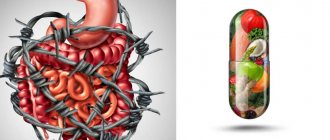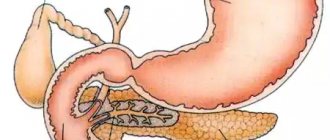Home>Articles>Pathological causes of vomiting blood after alcohol
quick menu (hide)
- Causes of intoxication
- Causes of vomiting blood
- Diagnoses that provoke nausea
- Classification of internal bleeding
- Diagnosis of Mallory-Weiss syndrome
- Detection of internal varicose veins
- Ulcer as a cause
- Detection of blood clots
The craving for alcohol began to be perceived as a disease relatively recently. The root of alcoholism lies in the psychological state, so therapy for patients is based on medication and psychotherapeutic coding. Nausea and vomiting are the most common aggravating symptoms of a hangover. It is difficult to cope with such a phenomenon at home.
Intoxication – metabolic disorder
The state of alcohol poisoning can have dangerous consequences . Intoxication disrupts the functioning of the gastrointestinal tract. If you vomit blood after drinking alcohol, this is a symptom of a severe form of poisoning. Impact doses destroy internal organs over several years. The cause of alcoholism often manifests itself due to:
- depression;
- social environment;
- physical stress;
- complex;
- feelings of loneliness;
- difficult life problems.
A kind of alcohol-based depressant, on the one hand , relaxes and gives confidence. On the other hand, it causes irreparable damage to the body. Large doses affect the intestinal walls and change the structure of cells. The ability to absorb vitamins and minerals decreases - this ends in exhaustion with manifestations of gag reflexes. Intoxication is observed not only in chronically ill people; people who rarely drink with individual intolerance vomit blood after drinking alcohol.
Medicines to help with vomiting
For frequent vomiting, when there is a risk of dehydration, doctors use effective antiemetic drugs (antiemetics). They allow you to stop painful attacks and prevent health-hazardous consequences. They work by blocking various pathogenetic components of the gag reflex.
Antiemetics include serotonergic and dopaminergic drugs, some antihistamines, anticholinergic drugs, and NK1 receptor antagonists. It is not recommended to take them without a doctor's prescription, as negative side effects may occur.
Vomiting blood after alcohol - reasons
Forced emergency emptying of the stomach due to the abuse of wine, cognac, and beer is associated with symptoms of dangerous diseases. In such cases, you should immediately consult a doctor. The causative agents of this unpleasant process can be diseases :
- central nervous system;
- gastrointestinal tract;
- biliary tract;
- liver failure;
- pancreas;
- endocrine glands;
- urinary tract.
note
Systematic consumption of alcohol causes irreparable damage to health, rewarding a person with a “collection” of diseases associated with disorders of the gastrointestinal tract.
Effective treatments
Therapy for vomiting blood after drinking alcohol is prescribed only on the basis of laboratory tests , after gastroscopy and other diagnostic measures.
The main methods of treating vomiting attacks with bleeding:
- balloon tamponade with a probe;
- drug therapy through vasodilators and vasoconstrictors;
- cleansing the cavity of the digestive organs from blood clots by washing;
- endoscopic treatment methods - ligation, sclerotherapy, obliteration.
In the most severe and dangerous cases, treatment is carried out through surgery . Among the most effective surgical treatment techniques, preference is given to vein suturing, transsection of the esophagus, and portosystemic shunting.
Diagnoses that provoke nausea
Diseases associated with alcohol addiction occur in men/women of different age categories. Long-term binges throughout life, which become painful over time, include:
- pancreatitis;
- gastritis;
- cholecystitis;
- hepatitis.
Men who drink during a hangover often suffer from nausea. The intensity of multiple manifestations of intrauterine self-purification depends on the amount of drinking and general health.
Treatment of vomiting in the clinic of JSC "Medicine" (clinic of academician Roitberg)
Often the symptom goes away on its own. However, if its appearance was dictated by the presence of a serious illness, a visit to a specialist is required. Depending on the cause of vomiting, the diagnosis may be carried out by a general practitioner, pediatrician, gastroenterologist, infectious disease specialist or gynecologist.
An experienced doctor will carry out the required diagnostics, make a diagnosis and draw up the most appropriate treatment plan, first of all prescribing anti-vomiting medication.
JSC “Medicine” (clinic of academician Roitberg) employs the best specialists of the capital and region, conducting diagnostics using the most modern equipment of proven world brands. All this together makes the treatment process quick and as convenient as possible for the patient.
You can make an appointment with a doctor by calling +7 24 hours a day or using the feedback form on the official website of the medical center. The clinic is located in the central district of Moscow at 2nd Tverskoy-Yamskaya lane, building 10, next to the metro stations “Belorusskaya”, “Mayakovskaya”, “Tverskaya”, “Novoslobodskaya”, “Chekhovskaya”.
Classification of internal bleeding
Categories of symptoms vary . The danger of hangover syndrome is dehydration of the body, leaching of nutrients necessary for health and well-being.
Bleeding with a volume of 200-400 ml is expressed by:
- headache;
- feeling cold;
- general malaise;
- physical fatigue;
- dryness and unpleasant odor in the mouth.
Dangerous bleeding manifests itself as:
- weakness throughout the body;
- abdominal pain;
- noise/ringing in the ears;
- disturbances in the heartbeat rhythm;
- frequent dizziness;
- increased blood pressure;
- sweating, from general malaise.
The voice changes, becomes hoarse, quiet, a little hoarse, diarrhea is observed - black stools with a pungent odor. Blood clots that come out along with the contents of the stomach are dark in color. In case of intense bleeding, medical attention is needed, since it is impossible to stop the process on your own.
Features and accompanying manifestations
Vomiting after drinking alcohol indicates that the person has been poisoned. But, if blood admixtures are observed, this symptom indicates that the vessels have ruptured and hemorrhage has occurred inside the body. Therefore, an urgent examination is necessary to determine the severity of the pathological process.
With small blood losses in the body, up to 200 ml, there may be no associated manifestations. Although the patient may have this condition accompanied by:
- mild nausea;
- dry mouth;
- chills;
- loss of strength.
If the bleeding is severe, the condition worsens and, in addition to general malaise, the person begins to have noise in the ears, the heart beats rapidly, dizziness, and blood pressure readings are significantly higher than normal.
In this condition, sweating increases and the skin turns pale. Strong thirst leads to a hoarse voice. If the stomach or intestines are damaged, the patient may experience black, loose stools.
This is a dangerous condition that requires medical attention. Only a medical institution can take measures to prevent shock and death of the patient.
Before bleeding, the victim often feels severe pain, but gradually its intensity decreases. If the level of blood pressure in the artery increases significantly, the patient loses consciousness.
Diagnosis of Mallory-Weiss syndrome
Bleeding in the stomach, which comes from a longitudinal crack formed in the mucous membrane of the walls, is Mallory-Weiss syndrome. An accurate diagnosis of the disease can be made using endoscopic examination. Detection of an area damaged by a crack is accompanied by medical measures aimed at protecting the health and life of the patient .
If there is significant blood loss, the person is given maintenance saline solutions. After therapy, the patient must give up alcohol entirely. A freshly formed wound should not experience additional toxic effects. If necessary, alcohol dependence is treated, the following procedures are carried out:
- detoxification of the body;
- relieving withdrawal symptoms;
- strengthening therapy.
Heavy, fatty, spicy foods are excluded from the patient's diet . The main dishes are boiled or steamed foods. In severe cases, when therapeutic methods are not effective, surgical intervention is resorted to.
Diet
You will have to not only forget about alcohol, but also completely reconsider your diet. At first, it is better for the patient not to eat. The most important thing now is to drink plenty of fluids to prevent dehydration. It is useful to drink teas based on calendula, rosehip or chamomile. They have a calming effect, relieve inflammation and help you recover faster from illness.
Usually, significant relief occurs within 2-3 days. This is only if the patient observed bed rest and followed all the doctors’ orders. Properly selected food will help replenish the supply of nutrients and will not irritate the esophagus and stomach. During this period, it is important not to overload the liver and pancreas. All fried and fatty foods are completely excluded. You should also not eat marinades, preserves, raw vegetables and fruits, as well as red meat. Food should be soft, pureed, and at a comfortable temperature.
It is best to start with weak tea and jelly, gradually moving on to liquid porridge and diluted chicken broth. Next, move on to chopped chicken pulp and soft-boiled eggs. It is recommended to drink vitamin C to strengthen the body. After complete recovery, you will need to strictly follow a diet and regularly visit a gastroenterologist. A specialist will help you choose the right diet for the future.
Detection of internal varicose veins
Damage to the walls of the gastrointestinal tract allows blood cells to enter the venous system, provoking the development esophageal varices The flow of oxygen to surrounding tissues decreases, promoting the development of ulcers.
Varicose bleeding does not last long, the clots are light scarlet in color. With such manifestations, it is necessary to carry out diagnostics to identify ulcerative formations and begin therapeutic treatment. The dark color of thick discharge should alert you , and medical intervention cannot be avoided. Timely contact with medical professionals will speed up the recovery process, and in some cases, save the patient’s life.
The risk group includes young and elderly people; the main cause of the pathology is excessive consumption of strong drinks. When the gastric walls or esophagus are damaged, a person often experiences nausea, which is provoked by: gastritis, ulcers, internal varicose veins . There are other aspects of the diagnosis, these are:
- hereditary vascular weakness;
- long-term physical activity;
- sedentary lifestyle.
The development of varicose veins can be slowed down if you follow simple rules: give up strong alcoholic drinks, do not get carried away with hot wines, saunas, prolonged exposure to the sun, and then the question: “why vomits blood after alcohol” will disappear by itself.
Doctors' recommendations
What not to do?
There are prohibitions. They are respected. It is dangerous to aggravate the hangover syndrome. Forbidden:
- inhibit the release of gastric contents;
- drive a car;
- smoking;
- swim in bodies of water because sudden temperature changes are harmful.
Due to the stress on the circulatory system, sports activities are excluded.
You cannot drink alcohol on an empty stomach. Otherwise, you will quickly begin to feel sick, and intoxication will not be long in coming.
To overcome a hangover, do not take other alcoholic drinks. For example, if you drank wine before, you should not drink beer. Improvement will come, but not for long. The body will receive a greater blow.
Is it necessary to artificially induce vomiting when you feel sick after drinking alcohol? The idea deserves attention. It is undesirable to deliberately provoke the vomiting process. It must begin on its own: a drunk person has no control over what he does. The esophagus is often damaged - punctured or scratched. This applies to the situation when the drinker puts a sharp object in his mouth, rather than his fingers.
Continuous vomiting also provokes other problems:
- throat injuries;
- dehydration;
- esophageal and gastric ulcers;
- electrolyte imbalance - a violation of salt concentration in tissues and blood.
Doctors advise getting rid of unpleasant symptoms by following the rules:
- When the acute nausea has gone away, it’s worth having breakfast. Suitable options include boiled eggs, vegetable salad, chicken broth;
- drink mineral water, then the water-salt balance returns to normal;
- Water procedures will restore strength, a contrast shower will help;
- go for a walk, walk in the fresh air in the park, by the river, and so on. Activity will speed up metabolic processes, speed up recovery, and restore good health.
Easy-to-follow recommendations help you get rid of a hangover, gain new strength, and perk up. When you have free time, it is better to go to bed and rest.
Author of the article: Yakovlev Evgeniy Anatolyevich
Narcologist, Candidate of Medical Sciences.
An ulcer is the cause of vomiting
Ethyl alcohol increases the amount of hydrochloric acid , which begins to corrode the walls of the gastrointestinal tract, creating the ground for the development of intrauterine diseases. A high level of acid-base balance suppresses the production of mucin, which performs the protective function of the mucosa. Therefore, sharp/burning pains occur in the upper abdomen, indicating a possible pathology - a gastrointestinal ulcer. In case of destruction of large vessels, perforation of the ulcer occurs, accompanied by deformation of the stomach, which leads to the formation of peritonitis. Aggravating symptoms of a hangover, when vomiting blood after drinking alcohol, occur when:
- using drinks of dubious quality;
- drinking different types of wine at the same time;
- excessive amounts of drinking.
It is important to know:
Intoxication of the body leads to various consequences: dehydration, epileptic attacks, neurological disorders, decreased immunity, and a threat to life.
Liver cirrhosis and hepatitis
- Cirrhosis is a progressive disease that transforms liver cells into fibrinous tissue. When drinking strong drinks, black vomit occurs, liver function is impaired, and acute intoxication occurs.
- Hepatitis is the second degree of liver cirrhosis, the likelihood of a positive outcome is significantly reduced, alcohol abuse can be fatal.
Victims with this diagnosis need emergency medical care; doctors conduct a full examination and prescribe a course of treatment, depending on individual analysis parameters.
Diagnostic examination
First, the doctor talks with the patient and examines him. It is important for a specialist to know:
- the amount of alcoholic experience;
- the type of alcohol that was recently consumed;
- the time when blood appeared in the vomit;
- about the presence of diseases of internal organs;
- the color of the vomit and the frequency of its separation.
Based on the survey results, the doctor draws up a plan for a diagnostic study. It may include: x-rays, ultrasound, gastroscopy, urine and blood tests. When a specialist receives the results of the examination, he will be able to confirm or refute the preliminary diagnosis and select effective medications.
Detection of blood clots - what to do
In case of severe intoxication, treatment must be carried out under medical supervision . The time for complete recovery depends on alcohol intoxication or the duration of the binge, since therapeutic intervention provides for recovery from a hangover. A person who likes to raise a glass to the health of loved ones needs to learn to control the amount of wine or champagne they drink. Self-control will help you avoid serious and sometimes irreparable health problems.
First aid
After a long binge, a situation arises accompanied by unpleasant manifestations of weakness, dizziness, loss of coordination of movements, uncontrolled emptying of the stomach - the first thing you need to do is call an ambulance. Then:
- Place the patient on a flat bed.
- If you feel cold, cover with a blanket.
- Reduce hangover syndrome by giving activated charcoal based on body weight.
- Every quarter of an hour, turn over to the other side.
- You cannot leave the patient alone; he may choke on vomit.
- Give only clean water to drink, without gas.
- Before the doctors arrive, measure and record your heart rate.
- It is prohibited to feed the patient before examination by doctors. The condition may get worse.
In the hospital, experienced doctors prescribe complex diagnostics and a number of laboratory tests.
Other ways to combat the gag reflex during alcohol poisoning
The following simple techniques help some people with alcohol intoxication:
- taking five grams of vitamin C;
- drinking small sips of a weak solution of baking soda (take 5 teaspoons of the composition per liter of water);
- using freshly squeezed lemon and orange juice (but you should not drink them if you have stomach diseases);
- Take three tablespoons of glucose solution every hour.
It is clear that these recommendations will not help with severe vomiting after binge drinking. You can resort to them only in case of nausea or periodic vomiting. If an alcohol addict feels very bad and there is blood in the vomit, it is unacceptable to refuse medical help.
Duration of withdrawal of alcohol from the body
If we convert alcohol into ppm, as all experts do, it turns out that men, after prolonged drinking of alcoholic beverages that ended in binge drinking, lose from 0.1 to 0.15 ppm for each passing hour. In women, a maximum of 0.1 ppm is released in one hour, fluctuating at the level of 0.08 - 0.09.
To evaluate these indicators, we note that a man with an average weight of 80 kg begins to get drunk after 0.3 ppm of alcohol appears in his body (500 ml of beer, a glass of dry wine or 50 ml of vodka). For women, these figures are two times lower.
If after a feast there are three ppm in the blood, this means that it will be possible to completely remove it from the body after more than one day. If there is even more alcohol, it will take correspondingly more hours for the body to completely get rid of ethanol and related toxins. A dose of 4-5 ppm is considered by narcologists to be deadly.
According to the estimates of narcologists, who calculate how long it will take a person to come out after a binge, it turns out that in minimal quantities alcohol remains in the body for at least two weeks, in particular in the cerebrospinal fluid and urine. Only after this period has expired can we say that the body has managed to completely get rid of ethanol and its breakdown products.











